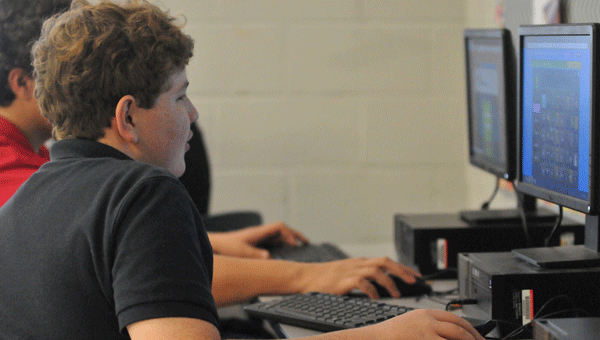Grant to give BCSS’s networks a boost
Published 9:43 am Wednesday, November 30, 2016

Greenville Middle School students, as well as those around the county, will notice a substantial improvement in wired and wireless Internet connectivity soon courtesy of the E-Rate program.
Students, faculty and staff within the Butler County School System will soon experience greatly expanded wireless connectivity on campuses, thanks to the system’s earning of the annual E-Rate grant.
The E-Rate program provides discounts to assist schools and libraries in the United States to obtain affordable telecommunications and Internet access.
The Universal Service Administrative Company (USAC) administers the program, and committed approximately $300,000 of the total $353,000 needed for the project.
The remainder was covered courtesy of the Alabama Ahead Act, which recently went through the state legislature.
Matthew Shell, technology director of the Butler County School System, said that the grant would provide a significant boost to online networks across the county.
“We are upgrading our existing wire and wireless networks with more capable gear,” Shell said.
“We are greatly expanding our wireless capacity, as well as supporting the faster speeds—such as 802.11AC—that newer wireless clients are capable of.”
In 2016, upgrades to a school’s online infrastructure are more important than they’ve ever been in this increasingly digital age.
“The Internet has transformed schools greatly over the past 20 years,” Shell said. “When I graduated from Georgiana High, we had one computer with the Internet in our Library. That was it. Now, we have around 1600 active devices per day with access to the Internet.
“Usage for the Internet ranges from teachers recording attendance, grades and lesson plans in our Student Information System to providing voice and voicemail services for employees county-wide. From an educational perspective, nearly all research is done via the Internet. Students can participate in virtual field trips; required standardized tests are often taken online; students can apply for college admissions, scholarships, and jobs, or even take dual enrollment college courses online.”
Wireless connectivity within the Butler County School System has changed drastically, even within just the past decade.
Shell said the schools had very limited wireless coverage when he began working for the Butler County School System in 2004, and they’ve since been upgraded to cover 100 percent of the campuses as of 2007.
“However, the quality of that coverage would have been inadequate based on today’s needs,” Shell added. “Back then we saw maybe 300 wireless clients spread out over a pretty large area. Today, just one of our schools will have more than 300 wireless devices connected at a given time, and sometimes within a relatively small area. This has created issues with our existing and previous wireless networks. The new network that is being installed will not only provide the coverage that we need, but also support the density that we are starting to see in today’s world.
“It’s not unusual to see a single student with three wireless devices on them. They could be using a Chromebook, have a smartphone in their pocket, and be wearing a smartwatch with a Wi-Fi connection. We have to be sure that we provide wireless services that can handle that many active clients. Wireless networks are a three to five-year investment right now because of how quickly the technology is still evolving. Part of the challenge is designing a network that will not only meet your current needs, but also your future needs (which are often a bit of an unknown) for that time period.”
For Shell, it’s a challenge that is absolutely worth tackling.
The Internet is often considered the great equalizer for students in smaller counties with less access to resources. And though many of Butler County’s youth utilize the Internet on a daily basis for streaming video, playing games or social media, Shell said that the school system’s goal is to reveal the other opportunities that the Internet provides.
“Nearly anything you are interested in learning is available online, and a lot of it for free,” Shell said. “If you want to pursue a college degree, but have transportation or scheduling limitations, you can absolutely still earn a degree from brick and mortar colleges completely online. A person, student or adult, who has an interest in any type of Information Technology work can improve their skills and run a business completely online.
“There are very few well paying futures that don’t involve technological skills. Our high school students are required to complete an online course during high school so they are exposed to that kind of setting.”



